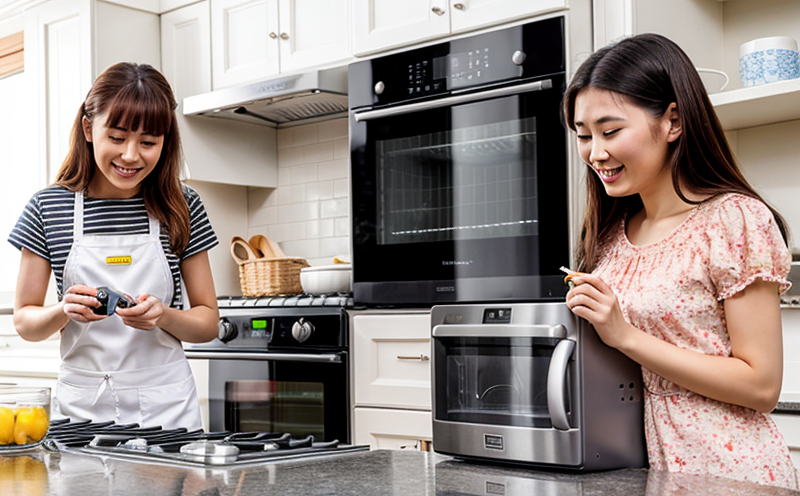EN 55014 EMC Testing for Household Appliances
The European Standard EN 55014 is part of a series that specifies limits and methods for electromagnetic compatibility (EMC) in the field of household appliances, medical equipment, commercial electronic equipment, etc. This standard ensures that electrical devices do not emit excessive levels of electromagnetic interference (EMI), which could disrupt other devices or cause safety hazards.
Household appliances are a critical category due to their widespread use and potential impact on public health and the environment. Ensuring compliance with EN 55014 is essential for manufacturers to avoid costly product recalls, protect consumers from harmful emissions, and meet regulatory requirements in Europe. The standard covers both conducted and radiated emissions, ensuring that appliances operate safely within specified limits.
The testing process involves a series of rigorous checks on the electromagnetic characteristics of household appliances. This includes measuring the emission levels from the device under test (DUT) to ensure they do not exceed the permissible limits set by EN 55014. The standard defines specific frequency bands and power levels for emissions, which are critical in preventing interference with other electronic devices.
Testing typically involves placing the appliance within an anechoic chamber, a specialized room designed to absorb electromagnetic radiation, ensuring accurate measurements of both conducted and radiated emissions. The DUT is then subjected to various test conditions, including static load tests, dynamic load tests, and operational tests under different environmental conditions.
The testing process also includes the use of precise measurement instruments such as spectrum analyzers, network analyzers, and far-field antennas. These tools provide detailed insights into the electromagnetic behavior of the appliance, helping to identify any potential issues before they become critical faults or safety hazards.
| Test Parameter | Description | Standard |
|---|---|---|
| Conducted Emissions | Emissions that travel through wires and cables, measured using a spectrum analyzer. | EN 55014-2 |
| Radiated Emissions | Emissions that propagate into the surrounding environment, typically measured at a distance of 3 meters from the appliance. | EN 55014-1 |
| Harmonics and Interference | Emissions in specific frequency bands that can interfere with other devices. | IEC 61000-4-3 |
The testing process is not only about meeting the technical requirements of EN 55014 but also ensuring that the appliance operates safely and effectively in real-world conditions. This includes considering factors such as ambient temperature, humidity levels, and operational stress, which can significantly impact the electromagnetic performance of household appliances.
In summary, EN 55014 EMC testing is a critical process for manufacturers of household appliances, ensuring that their products meet stringent safety and compatibility standards. By adhering to this standard, manufacturers can protect consumers from potential hazards, comply with regulatory requirements, and maintain a strong market presence in Europe.
Scope and Methodology
The scope of EN 55014 includes the measurement of conducted and radiated emissions for household appliances operating within specific frequency bands. The standard covers both residential and commercial applications, ensuring that devices do not emit excessive levels of electromagnetic interference.
The testing methodology involves placing the appliance in an anechoic chamber to measure its emissions accurately. Conducted emissions are measured using a spectrum analyzer, while radiated emissions are typically measured at a distance of 3 meters from the device.
The test conditions include static load tests, dynamic load tests, and operational tests under various environmental conditions. These tests help simulate real-world usage scenarios and ensure that the appliance operates safely and effectively.
For conducted emissions testing, a current clamp or differential probe is used to measure the voltage and current at specific points on the power supply lines. The measured values are then compared against the permissible limits set by EN 55014-2. For radiated emissions testing, a far-field antenna is positioned at a distance of 3 meters from the appliance, and the radiation levels are measured using a spectrum analyzer.
The test results are documented in a detailed report that includes all measurement data, test conditions, and compliance with relevant standards. This report serves as evidence of the appliance’s electromagnetic compatibility and helps manufacturers ensure their products meet regulatory requirements.
Eurolab Advantages
Eurolab offers comprehensive EN 55014 EMC testing services for household appliances, leveraging its expertise in electronics testing to provide high-quality, accurate, and reliable results. Our state-of-the-art facilities and experienced staff ensure that every test is conducted according to the latest standards and best practices.
We offer a range of services tailored to meet the specific needs of our clients, including:
Pre-compliance testing
Post-production validation
Failure analysis
Customized test setups for unique products
Comprehensive reporting and certification support
Our clients benefit from our deep knowledge of EN 55014 and its associated standards, ensuring that they can confidently meet regulatory requirements and market demands. Our team is dedicated to providing prompt, efficient service with minimal disruption to your production schedule.
Environmental and Sustainability Contributions
Reduction of electromagnetic interference: By ensuring compliance with EN 55014, we help reduce the risk of interference between electronic devices. This contributes to a cleaner, more efficient environment.
Enhanced product reliability: Ensuring that household appliances meet strict EMC standards leads to higher-quality products that operate reliably and safely for extended periods.
Minimized environmental impact: By preventing the release of harmful emissions into the environment, we help reduce the overall carbon footprint associated with electronic devices.
Our commitment to sustainability is not just about meeting regulatory requirements but also about promoting responsible manufacturing practices. By adhering to EN 55014 and other relevant standards, we contribute to a greener future by ensuring that our products are safe, reliable, and environmentally friendly.





